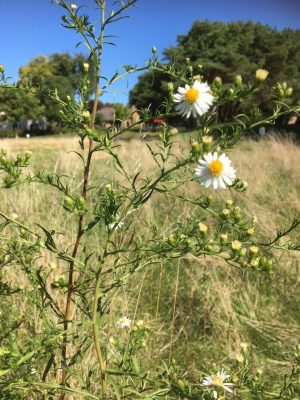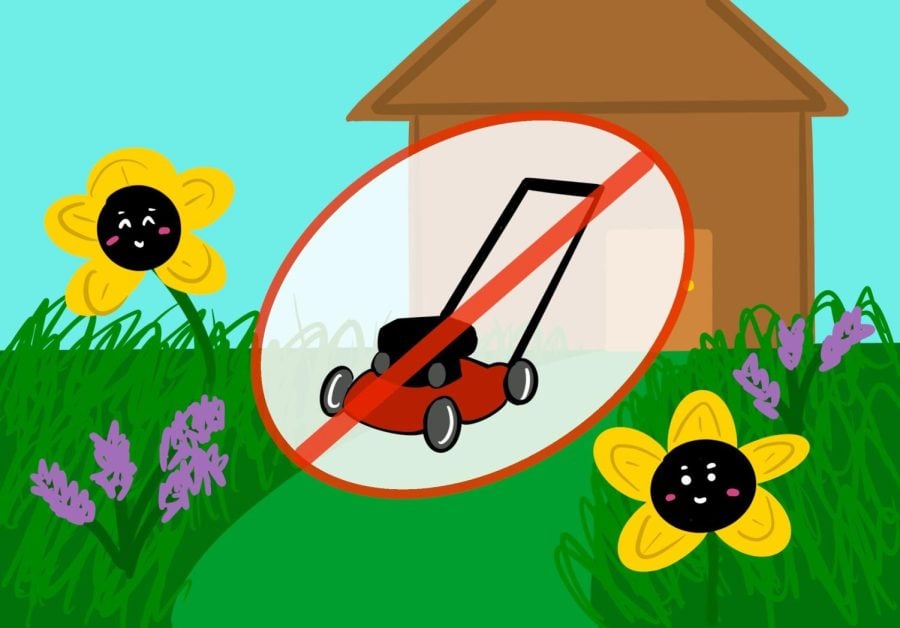No Mow May pushes residents to swap grass cutters for gardens
No Mow May, which Evanston homeowners are taking part in, is a nationwide initiative that encourages people not to mow their lawns during the month of May.
April 21, 2022
When heavy rains hit Lovelace Park three years ago, Evanston resident Sigrid Pilgrim said the city couldn’t use its heavy mowing equipment on the wet ground. Instead, the city let the grass grow freely.
“The grass was about two feet tall, and it just looked absolutely gorgeous,” Pilgrim said. “There were some native wildflowers that came up, little hairy asters that came up and just looked so pretty.”
Pilgrim and her neighbors came together to start the Friends of Lovelace Park, a community organization that advocates for preserving the park’s natural habitat. Though the lawn in Lovelace Park has since been mowed, the group is still advocating for the city to put away its lawnmowers.

Homeowners around Evanston are participating in No Mow May, a nationwide initiative that encourages people not to mow their lawns during the month of May. Studies from national organizers show letting grass grow uninterrupted helps protect pollinators and the plants they rely on, in addition to keeping chemicals out of the ground. Now, Natural Habitat Evanston, a group dedicated to protecting the city’s biodiversity, is working to bring the movement to the city’s yards.
Leslie Shad, the founder and lead of the organization, said the group’s No Mow May initiative aims to help more residents plant native flora to attract more pollinators to their yards year round.
“This is the beginning of a step toward really sustainable yards,” Shad said. “I’m all about changing the culture of lawns and trying to encourage people to replace their lawns with pollinator gardens, trees and shrubs.”
As a part of Citizens’ Greener Evanston, a citywide group focused on large-scale environmental advocacy, NHE leads volunteers in planting trees and pollinator gardens in local parks. NHE also encourages residents to take the Pollinator Pledge to protect native plants, which help pollinators like bees and caterpillars survive through the spring and summer months.
Shad also said her efforts in planting trees and promoting NHE’s Pollinator Pledge are particularly focused in areas of Evanston where there is less tree canopy. In the 5th Ward especially, she said she has noticed narrower parkways leave less room for trees along the streets, preventing native plant growth and providing residents with less protection from seasonal heat.
However, organizers have faced some pushback from residents. Third Ward resident Nancy Bradt, an NHE volunteer, said many of her neighbors are very committed to keeping their grass green and free from native plants.
“We’re a nation of keeping our lawns very tight,” Bradt said. “It is pretty much an obsession (for) a lot of people.”
This more normative style of lawn maintenance is also enforced by the city, organizers said. Evanston has an ordinance against weeds or turf grass taller than 8 inches, limiting how much residents can let their grass grow.
Pilgrim also said regular mowing in city parks has prevented the Lovelace Park meadow from growing the tall grass it once had.
“Our challenge was to get the city to recognize that there would be benefits by not mowing that area,” Pilgrim said. “Especially some of the native plants that have roots that go down 12 to 14 feet.”
As No Mow May campaigns work to change residents’ thinking about lawn maintenance, Shad said there is still work to be done to drive home the issue’s urgency to residents.
Shad said protecting pollinators through these practices is not just a helpful practice — it is a “moral imperative.”
“Humans will find a way to manufacture or synthesize food, whatever they do, but I think it’ll be a poor world if we don’t have biodiversity,” Shad said. “There’s this love and joy and all the expression of other creatures that we lose if we push them out.”
Email: lilycarey2025@u.northwestern.edu
Twitter: @lilylcarey
Related Stories:
— Evanston made hosts month-long celebration honoring Earth Day
— Evanston environmental groups team up for an Earth Month kickoff party
— ‘A reunion of the environmental community’: Evanston celebrates Earth Month this April



